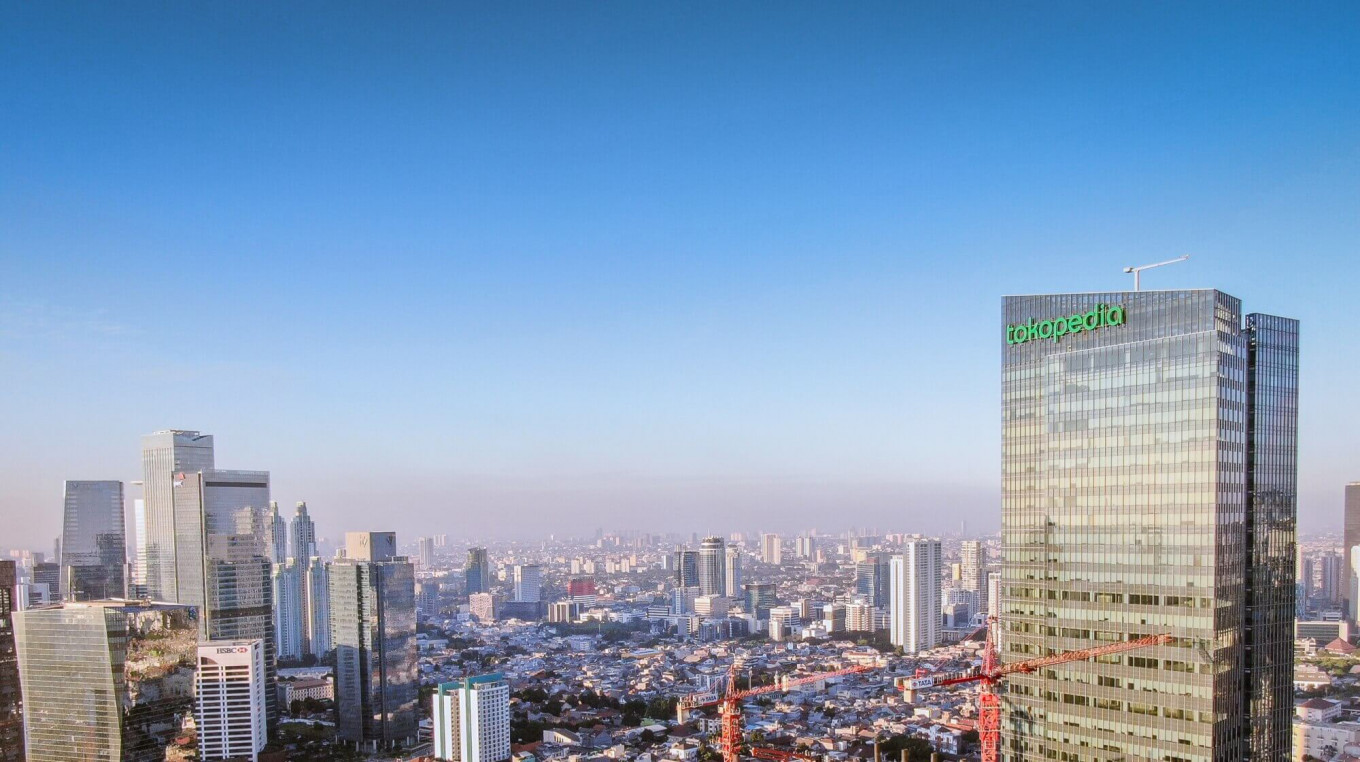Popular Reads
Top Results
Can't find what you're looking for?
View all search resultsPopular Reads
Top Results
Can't find what you're looking for?
View all search resultsComprehensive e-commerce ecosystem key to boosting Indonesia’s digital economic growth
Change text size
Gift Premium Articles
to Anyone
V
arious statistics have shown that the e-commerce sector has been contributing significantly to the Indonesian economy over the years, most significantly in giving micro, small and medium enterprises (MSMEs) a much-needed boost.
Data recorded in 2019 by market and consumer data firm Statista, for instance, revealed that the e-commerce sector had contributed additional revenue of US$30.2 million to the national economy.
Meanwhile, the Institute for Demographic and Poverty Studies (IDEAS) revealed in the same year that the e-commerce sector had boosted national economic growth by 2.8 percent. IDEAS also revealed that simultaneously, the sector contributed 22 percent to the creation of new jobs during the same year.
Furthermore, a 2019 study by the Centre for Strategic and International Studies (CSIS) revealed that merchants who partnered with e-commerce platforms enjoyed a 12 percent profit boost in their operations, simply by tapping into the wider consumer base that these platforms have.
“By partnering with these e-commerce platforms, these merchants can also boost their online presence. These merchants also enjoy greater flexibility of selling their products regardless of geographical boundaries,” CSIS research assistant Adinova Fauri told The Jakarta Post on Oct. 30.
“Our research studies have also revealed that MSMEs were among those that benefited most from these digital platforms, as tapping into the e-commerce platforms helped them to increase their sales figures dramatically,” he said.
Adinova said the think tank had not yet conducted any studies gauging the impact of the accelerated consumer adoption of online shopping during the COVID-19 pandemic on the economic performance of these e-commerce platforms.
But he made an intelligent guess, “Now, as people try to avoid shopping in public spaces like shopping malls as much as they can, I believe that the e-commerce sector can serve as one of the backbones of our national economy during the pandemic.”
Indonesia already has a competitive advantage in terms of its huge middle-class chunk; local e-commerce platforms just need to make continuous efforts to make sure they have a strong ecosystem to ensure sustainable growth, according to Adinova.
Apparently, a lot of homegrown e-commerce platforms seem to want to seize this opportunity by building bigger ecosystems involving relevant stakeholders to tap into more business partners and consumers to create an even bigger multiplier effect for the Indonesian economy.
One of them is Tokopedia. Recently, it announced its ambition of transforming into what it calls a “Super Ecosystem.”
“We define a Super Ecosystem as a comprehensive infrastructure to support and collaborate with various strategic partners to grow together. [This way, we can] accelerate the process of leveling the digital economy playing field in the country,” Tokopedia corporate communications vice president Nuraini Razak said.
The elements that Tokopedia has been taking – and will always continue to take to demonstrate its commitment to building a Super Ecosystem – include expanding on its digital marketplaces and products, amping up on logistics and fulfillment centers, as well as strategic partnerships.
“For instance, in 2019 Tokopedia officially acquired Bridestory, a reputable wedding marketplace platform which connects brides- and bridegrooms-to-be with tens of thousands of well-curated vendors,” Nuraini wrote in an email.
It had also acquired Parentstory, a marketplace with a trustworthy membership system which helps parents look for and try out various activities for their children, according to Nuraini.
She continued that currently Tokopedia had already ventured into providing 42 new types of daily bill payment services through which users can pay their phone credit, insurance premium, water, electricity bills and even taxes.
Adinova explained that the acquisition and business divergence strategy offered a win-win solution for both the big platforms and the smaller marketplaces in their efforts to expand their businesses.
“By making these acquisitions, the big platforms will benefit from the so-called ‘network effect’ - acquiring the smaller marketplaces will result in much more diverse types of products being sold on their platforms, attracting a wider range of consumers as a result,” Adinova said.
He went on to say that having a wider range of consumers would also make homegrown e-commerce platforms appear more attractive to investors, since a big consumer base translated to profitability. Smaller marketplaces, meanwhile, could boost their income by tapping into the big platforms’ consumer base.
. (Courtesy of/Tokopedia)Still in the realm of diversifying its products and services, Tokopedia is focusing on working together with local MSMEs – the other essential backbone of the Indonesian economy (according to data from thejakartapost.com, MSMEs accounted for 60 percent of Indonesia’s gross domestic product (GDP).
“[As of September 2020], the Tokopedia platform comprised more than 9.4 million sellers marketing more than 350 million products, serving more than 100 million active users per month across 98 percent of districts in Indonesia. About 86.5 percent of these sellers are emerging businesspeople who have just started their own businesses,” Nuraini explained.
She added that the majority of these emerging new businesspeople were housewives, university students as well as former employees who had already resigned from their corporate jobs: “These people have reinvented themselves as new MSME players.”
Adinova, meanwhile, also said local e-commerce platforms had also done their share to solve various logistics and distribution challenges for many Indonesian MSME businesspeople, by setting up fulfillment centers (locally known as pengepul), significantly bringing operational costs down for these businesses.
Tokopedia also has such fulfillment centers called TokoCabang in Jakarta, Bandung in West Java, Surabaya in East Java, Makassar in South Sulawesi, Palembang in South Sumatra and Medan in North Sumatra.
The merchants can just consign their products in these fulfillment centers and the Tokopedia team will just take care of the whole distribution process, with the aid of big data analytics and artificial intelligence.
Thanks to the state-of-the-art technology it uses, Tokopedia’s analytics provides merchants with insights into consumer trends, helping merchants stockpile their products in the centers all the while.
Regarding Tokopedia’s provision of daily bill payment services mentioned above, the new services are but a few new innovations that it has coined to make financial matters more convenient for Indonesians and accelerate financial inclusion by venturing into fintech as well.
For instance, it has encouraged the general public to invest through its Tokopedia Emas (gold) and Tokopedia Reksa Dana (mutual funds) services.
The subject of fintech takes us to a discussion about several aspects that various stakeholders still need to constantly pay attention to in order to sustain Indonesia's economic growth through e-commerce.
Access to banking is one. This is important especially for MSMEs, since about 23 million local MSMEs are still not bankable. Currently, there are more than 60 million MSME entities in Indonesia.
“E-commerce requires you to transfer your money via bank accounts and use credit cards to pay for things, which makes bankability and financial literacy highly important. Thankfully, right now payment applications also help bridge these small businesspeople to online transaction and e-commerce services,” Adinova said.
Another aspect that needs to be improved is Indonesia’s internet infrastructure and technology to help people, especially in remote and deprived areas, to access these services, “Indonesia’s internet penetration level stands at only 64 percent, which is relatively low,” he explained.
Finally, beyond technology, there is the trust factor.
“For instance, e-commerce platforms have to devise concrete mechanisms to protect their merchants from potential fraud committed by consumers, Adinova said.
“All this time, we have focused too heavily on how to protect the consumers but we’ve forgotten about strict measures that we should take to protect the producers as well, such as how to guarantee the producers’ money in cases of consumer fraud,” he continued.
Nuraini, meanwhile, said that for the next 10 years, Tokopedia would continue to pay attention to these things on its way of making its “Super Ecosystem” dream come true, to serve its consumers better and contribute to Indonesia’s economy, aligned with its motto #SelaluAdaSelaluBisa (Always Present, Always Reliable).













